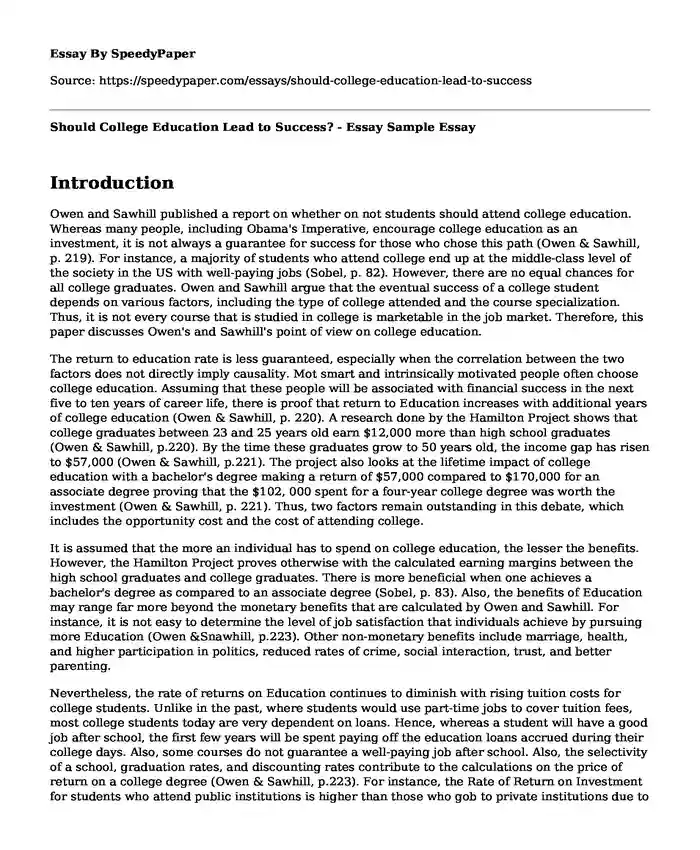Introduction
Owen and Sawhill published a report on whether on not students should attend college education. Whereas many people, including Obama's Imperative, encourage college education as an investment, it is not always a guarantee for success for those who chose this path (Owen & Sawhill, p. 219). For instance, a majority of students who attend college end up at the middle-class level of the society in the US with well-paying jobs (Sobel, p. 82). However, there are no equal chances for all college graduates. Owen and Sawhill argue that the eventual success of a college student depends on various factors, including the type of college attended and the course specialization. Thus, it is not every course that is studied in college is marketable in the job market. Therefore, this paper discusses Owen's and Sawhill's point of view on college education.
The return to education rate is less guaranteed, especially when the correlation between the two factors does not directly imply causality. Mot smart and intrinsically motivated people often choose college education. Assuming that these people will be associated with financial success in the next five to ten years of career life, there is proof that return to Education increases with additional years of college education (Owen & Sawhill, p. 220). A research done by the Hamilton Project shows that college graduates between 23 and 25 years old earn $12,000 more than high school graduates (Owen & Sawhill, p.220). By the time these graduates grow to 50 years old, the income gap has risen to $57,000 (Owen & Sawhill, p.221). The project also looks at the lifetime impact of college education with a bachelor's degree making a return of $57,000 compared to $170,000 for an associate degree proving that the $102, 000 spent for a four-year college degree was worth the investment (Owen & Sawhill, p. 221). Thus, two factors remain outstanding in this debate, which includes the opportunity cost and the cost of attending college.
It is assumed that the more an individual has to spend on college education, the lesser the benefits. However, the Hamilton Project proves otherwise with the calculated earning margins between the high school graduates and college graduates. There is more beneficial when one achieves a bachelor's degree as compared to an associate degree (Sobel, p. 83). Also, the benefits of Education may range far more beyond the monetary benefits that are calculated by Owen and Sawhill. For instance, it is not easy to determine the level of job satisfaction that individuals achieve by pursuing more Education (Owen &Snawhill, p.223). Other non-monetary benefits include marriage, health, and higher participation in politics, reduced rates of crime, social interaction, trust, and better parenting.
Nevertheless, the rate of returns on Education continues to diminish with rising tuition costs for college students. Unlike in the past, where students would use part-time jobs to cover tuition fees, most college students today are very dependent on loans. Hence, whereas a student will have a good job after school, the first few years will be spent paying off the education loans accrued during their college days. Also, some courses do not guarantee a well-paying job after school. Also, the selectivity of a school, graduation rates, and discounting rates contribute to the calculations on the price of return on a college degree (Owen & Sawhill, p.223). For instance, the Rate of Return on Investment for students who attend public institutions is higher than those who gob to private institutions due to the difference in costs.
Conclusion
Conclusively, in agreement with Owen and Sawhill, there is varying evidence on the return to investment in college education. Therefore, any researcher would go beyond basic figures to determine what else affects the benefits of college education (Carlson, p. 14). Other than essential opportunity costs and expenditure on tuition fees, other factors should be considered. They include personal benefits like marriage, parenting, social interaction, job satisfaction, and trust (Owen & Sawhill, p. 223). Other factors include selectivity of institutions, whether a college is public or private, the cost of tuition, and the possibility to complete college (9Carlson, p.16). Therefore, the decision on whether to attend college or not lies in the student's hand even though one should consider the interests, costs, and marketability of the course they ought to pursue.
Works Cited
Carlson, Scott. "Should everyone go to college." The Chronicle of Higher Education (2016). http://www.shellpoint.info/InquiringMinds/uploads/Archive/uploads/20161028_Should_Everyone_Go_To_College.pdf
Owen, Stephanie, and Isabel Sawhill. Should everyone go to college?. Brookings Institution, Center on Children and Families, 2013. https://drwilda.com/2013/05/page/6/
Sobel, Ann EK. "Should Everyone Go to College?." Computer 10 (2012): 82-83. https://www.computer.org/csdl/mags/co/2012/10/mco2012100082.pdf
Cite this page
Should College Education Lead to Success? - Essay Sample. (2023, Sep 16). Retrieved from https://speedypaper.com/essays/should-college-education-lead-to-success
Request Removal
If you are the original author of this essay and no longer wish to have it published on the SpeedyPaper website, please click below to request its removal:
- Essay Sample on State of Integration Technology in Education
- Research Proposal Paper Sample: The Leisure Activities and Behaviors of Students at UCLA
- The Zero Tolerance Approach: Essay Sample
- Essay Sample on Difference Between A DNP and A Ph.D. in Nursing
- Essay Sample on Applying UDL to Curricula - Audience and Content
- Learning from Others: A Journey Through Business and Life - Essay Sample
- The Political Goals of Public Schooling - Free Paper Sample
Popular categories





